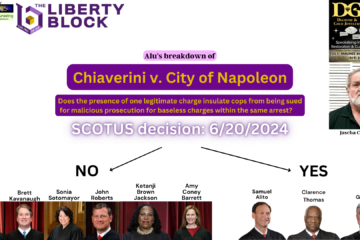April 18 is Theft Day for 2023. Also known as tax day, income taxes are due. Behind the IRS tax form is a gun. The IRS has 4,487 guns and 5,062,006 rounds of ammunition (2017 GAO data). Why? Because income tax is theft.
We own our bodies. We own the output of our labor. Money earned is property, our labor’s output in a form convenient for exchange. Taking money from the rightful owner is theft of property. The income tax is morally equivalent to being robbed on the street at gunpoint – the only difference is the thug who took it and how transparent the theft is.
Slavery is when someone claims ownership of the body and labor of another. The government claims it owns the output of your labor, and decides how much you can keep. The top federal income tax rate is 37%. The government demands your labor output and will use force to get it. When a man is 37% a slave and 63% free, is he a free man or a slave?
The answer to ethical questions doesn’t change between individual and group situations. It is often helpful to switch from groups to individuals to make it easier to see the morally correct answer when it isn’t obvious for the collective. Say my left neighbor is poor and my right neighbor is wealthy. Is it ethical for me to take 37% of my right neighbor’s earnings and give it to the left neighbor?
How about if my block gets together and takes 37% of the right neighbor’s money to give it to the left neighbor? How about if my town votes to take 37% of the income of the richest 25 people, and hands it out to whoever the Mayor says should get it?
Now ask the same question for 525 members of Congress voting (legislation), and then for 325 million people in a majority rule vote (mob rule, aka democracy). Then consider the same question if Congress proposes it and 2/3 of the state legislatures ratify it (16th Amendment). Spoiler alert – it’s all one question so there is only one answer. The collective vs. individuals difference doesn’t change the answer, regardless of how big the mob is. It’s all theft.
“But let me offer you my definition of social justice: I keep what I earn and you keep what you earn. Do you disagree? Well then tell me how much of what I earn belongs to you – and why?”
― Walter E. Williams, “All It Takes Is Guts”
Former Professor of Economics, George Mason University
There are two ways property can be transferred between individuals. One is voluntary exchange, where both parties consent and both derive a benefit they judge for themselves as worth the trade. The second way is by force – taking property using the threat of or direct use of violence. Income tax uses the second method.
The Cambridge Academic Content Dictionary defines theft as “taking something that belongs to someone else and keeping it; stealing”. Theft is taking another person’s property without consent. Income tax, for example.
U.S. Constitution
America’s Framers decided that income tax would not be a delegated power of the general government, and specifically denied it. The U.S. Constitution says “No Capitation, or other direct, Tax shall be laid, unless in Proportion to the Census” in Article 1 Section 9. A direct tax is a tax exacted directly from the taxpayer. Exacted is to demand or get something, sometimes using force or threats. Capitation is a direct tax imposed on each person, a “head tax”.
The federal income tax, a direct tax, was made unconstitutional in the compact ratified on June 21, 1787. The states retained the power of direct taxation when forming the federal government. The tax authority delegated by the states to the federal government was limited to indirect taxes – excises, import duties, and other taxes uniform throughout these united states. The “industry” of citizens could not be lawfully taken by Washington DC as a direct tax.
“Sound principles will not justify our taxing the industry of our fellow citizens to accumulate treasure for wars to happen we know not when, and which might not perhaps happen but from the temptations offered by that treasure.”
– President Thomas Jefferson
First annual message to Congress, December 8, 1801
Income Tax History
The first federal income tax was imposed in 1861 by President Lincoln and Congress with the Revenue Act, unconstitutionally. The new tax was to fund the union’s military in the War for Southern Independence. It was a “temporary” 3% tax on annual incomes above $600, or $18,000 in 2023 dollars. Congress repealed this particular tax in 1871, but nothing is more permanent than a temporary government program.
Income tax was again imposed with the Wilson-Gorman Tariff Act of 1894, after having no income tax from 1873 – 1893 (Tariff Act Sec. 27, page 553). This was a 2% tax on incomes over $4000 ($140,000 today). In 1895 the Supreme Court declared the income tax unconstitutional, in Pollock v. Farmers Loan Trust Co. SCOTUS majority opinion was that income tax is unconstitutional and this part of the Tariff Act void. The tax scheme was dropped and there was no federal income tax from 1895 through 1912.
For 126 years federal income tax remained unconstitutional, until 1913 when the 16th Amendment was ratified. This was a new power the Founders had specifically denied to the federal government. The 16th Amendment says “Congress shall have the power to lay and collect taxes on incomes, from whatever source derived, without apportionment among the several States, and without regard to any census or enumeration.”
By ratifying the 16th Amendment the states handed a new power to the federal government that opened a floodgate for increasing the size and scope of Washington DC. The states in 1788 had retained the income tax power to protect themselves; the states destroyed that protection with the 16th Amendment. The Empire was unleashed in 1913 with a new source of money and power.
“Giving money and power to government is like giving whiskey and car keys to teenage boys”
– P.J. O’Rourke
“Parliament of Whores”, page 24
In 1913 the federal income tax brackets ranged from a 1% to 7% tax. The 2% rate didn’t kick in until above a $20,000 income, or $609,000 in today’s dollars. People earning under what would be half a million a year paid only 1% income tax – easier sell on passing the Amendment for a new tax method. A sly trick was pulled on the unsuspecting public. The 7% highest rate in 1913 was only on incomes above the equivalent of $15M today. “Tax the rich!” has always worked in politics. Then they come for thee.
It’s been downhill ever since 1913 as the government increased its take, raising rates and lowering the income levels the higher rates apply to. Now the top rate is 37% instead of 7%, and it applies on incomes over $600K rather than $15M. The bottom bracket today is 10% instead of 1%, and the rate increases above $20,000 income for a married couple instead of $609,000. Since 1913 the federal government has practiced the art of taking as much property as it can get away with. This isn’t a new thing for government.
“In general, the art of government consists of taking as much money as possible from one party of the citizens to give to the other.”
– Voltaire, 1764
The tax code is now represented by over 70,000 pages of documents. It’s a complex theft scheme. The statutes passed by Congress, Title 26, are published in two volumes totaling 2,652 pages. This is about 1 million words; twice as long as War and Peace. But that’s not close to it all, folks – the IRS regulations, rulings, and clarifications are another 4 million words, around 9,000 pages. Then you need the previously decided cases to understand it all and avoid jail. The CCH published “Standard Federal Tax Register” has everything needed for the income tax scheme, over 70,000 pages. The Tax Foundation made this handy chart from the CCH publications showing the complexity of what the federal government has done with its income tax power (2011 data).
How do they rationalize stealing all this money? A popular method is war. Wars have always been useful to the government to extract taxes. Wars were an excuse used in 1861, 1913, and in 2022. Stoking public fear and starting wars is needed to fund the Pentagon’s budget, so fear and wars we get. How else could the Senate in December 2022 have passed a new National Defense Authorization Act (NDAA) of $858 billion with a bipartisan vote of 83-11?
Only 11 Senators objected to nearly a trillion dollars for war-making this year, making me wonder who exactly are they representing. Are taxes raised because of wars, or are wars raised because of taxes? When something doesn’t make sense, follow the money.
“War is the parent of armies; from these proceed debts and taxes; and armies, and debts, and taxes are the known instruments for bringing the many under the domination of the few.”
– James Madison
Political Observations, April 20, 1795

Enforcers
The GAO reported the IRS investigation unit has 3,282 pistols, 621 shotguns, 539 rifles, and 15 fully-automatic firearms in a 2017 study. The GAO found the IRS ammo stockpile contains 3,151,500 handgun rounds, 367,750 shotgun rounds, 1,472,050 rifle rounds, and 56,000 fully-automatic weapon rounds (as of December 2017). Page 30 of GAO-19-175 has a table of the IRS stockpile and notes “these firearms are to be carried on duty so FLEOs are prepared for potentially dangerous circumstances”, and states they can “temporarily carry rifles or shotguns in anticipation of, or in response to, high-risk situations”. Does this sound like the equipment an accountant needs to keep track of a voluntary system of mutual benefit to both parties?
The reason the IRS has the firearms and ammunition stockpile of a small army is that their business is theft. This isn’t a voluntary arrangement. When you fill out your federal tax form, remember the form has 5 million rounds of ammunition behind it.
“I’ll say this plainly. I’ve said it before. Taxation is theft. It presumes that the government has a higher claim on our property than we do.”
– Judge Andrew Napolitano
Taxation is theft.
This article does not necessarily reflect the opinions of The Liberty Block or any of its members. We welcome all forms of serious feedback and debate.



1 Comment
John Brown · April 23, 2023 at 3:10 pm
All laws, rules, decrees, regulations, assessments, and ordinances are backed by violence or the threat of violence. Try not paying your taxes and see what happens. Eventually, men with guns will come to your door. If you resist arrest, they will kill you.
Comments are closed.